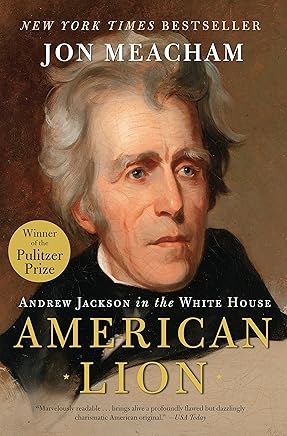|
Random House: NY, 2008. 
I am on a quest to learn more about Presidents of the United States, especially those that are less discussed. While Andrew Jackson is discussed in biographies, it seems that he is being glossed over in schools. I was only taught a few things about him: he was considered a heroic general, he opposed the National Bank which Alexander Hamilton founded, and he was an instigator of the Trail of Tears situation. So, I felt it was important to learn more about this President who was hugely popular before he was President. This book was recommended to me. As I read, I began wondering why Jackson's Presidency was not discussed in schools. Clearly, he was very popular. He managed to hold the union together despite the dissension in Washington. Yes, John C. Calhoun (as Jackson's Vice President) was already pushing for secession at that time. He also did succeed in stopping the National Bank, though another was started later. He was opposed by other strong factions as well: John Quincy Adams, Henry Clay, and their followers. I have some suspicions regarding skipping over him; it is probably political in nature. From a historical perspective it makes no sense, because Abraham Lincoln and the Roosevelts clearly followed in his footsteps, in using popular sentiment to gain strength and leverage and in using their strength to advocate for an expanded number of the people. Jackson wasn't the first. Thomas Jefferson also did, and so did Aaron Burr advocate for people of less property. (Note: Aaron Burr is also someone to learn more about. He was on a path to become President before allegations were brought against him, and the case against him was at best shadowy. He was not convicted.) There is no answer to my question here; that would take much more reading and study. I suspect it has to do with the fear of democracy in our government and the desire of other factions to retain power over the people. It may also be that Jackson's Presidency came at a time when the country was still young and developing. It makes politics and government easier to portray the country as this idea that was inevitable and heroic. Jackson planned to take power away from those that had been there for a long time, and as a result ended up fighting them constantly. It was messy, and would require people to reconsider some of what they have been told to believe. It seems to me this is what we need to be reading. Not only is it very interesting, but it also shows people that history is alive. People then were not legendary. They made mistakes too and at times behaved immaturely, just like today's politicians. It is important to compare to now and sift out what looks like it worked and what didn't. It also helps us measure how we got to this point. To me, that is what history is about. This book does a good job of discussing the background and characters of the time. It encourages me to read more, as a good book should.
|
|
Featured Posts
Recent NTugo Network Posts |
©2006-2016 BookAdvice.net. Advice, banner, and coding help given by Redwall_hp. Established May 2006.











